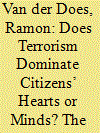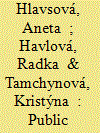|
|
|
Sort Order |
|
|
|
Items / Page
|
|
|
|
|
|
|
| Srl | Item |
| 1 |
ID:
183013


|
|
|
|
|
| Summary/Abstract |
Terrorism only poses a small risk to people but tends to be a major source of public fear. Through fear, terrorism has far-reaching implications for public governance. In this paper we look at trust in government as a potential mitigating factor of fear of terrorism. We discern between calculative trust, based on analytical assessment of previous and expected future actions, and relational trust, based on emotions and perceived value similarity with government. We find that relational trust decreases fear of terrorism. A similar but less robust negative relationship exists between calculative trust and fear. However, our regression analyses suggest that relational trust, in fact, may mediate the relationship between calculative trust and fear of terrorism. In other words, the more citizens think government is able to prevent terrorist attacks and feel that authorities are doing enough, the more they, in turn, feel that their government shares their values, and the less fearful they are of future terrorist attacks.
|
|
|
|
|
|
|
|
|
|
|
|
|
|
|
|
| 2 |
ID:
160306


|
|
|
|
|
| Summary/Abstract |
This essay analyses the role of public opinion in the formation of US and Turkish policy toward the conflict in Syria. The United States and Turkey were chosen because they are key players in the Syrian conflict. In both countries, public opinion played a role in the formation of foreign policy. As North Atlantic Treaty Organization allies, they could be expected to act along similar lines. Moreover, despite seemingly different contexts, public opinion in both the United States and Turkey was reluctant to support a more intense involvement in the Syrian conflict. However, there was a visible shift in public opinion after the involvement in Syria started to be framed as a fight against terrorism, mostly referring to the so-called Islamic State and, in Turkey's case, Kurdish groups.
|
|
|
|
|
|
|
|
|
|
|
|
|
|
|
|
|
|
|
|
|